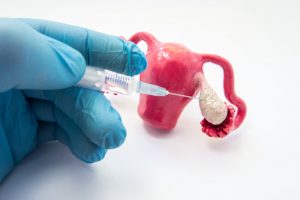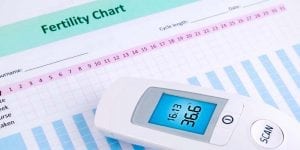Many women struggle with irregular ovulation. It’s important to know what this means if you’re trying to conceive and when to seek help.
Getting pregnant can be difficult enough for women who regularly ovulate. However, if you have irregular ovulation, you will have an even bigger challenge conceiving. It’s important to have the facts so you know where to turn when you’re experiencing this problem.
What Is the Recommended Time for Trying to Get Pregnant?
Women who are under the age of 35 who want to get pregnant should be able to do so within one year of trying if there’s no problem. However, if no conception occurs within one year, it’s recommended to seek help from a fertility specialist.
If the woman is older than 35, it’s advised not to wait a year to get fertility help. Instead, if pregnancy doesn’t occur after six months of trying, it’s recommended to get help to conceive.
 In some cases, it’s appropriate to seek fertility help sooner than one year or six months of trying to conceive. If you have certain medical conditions or a specific personal history, you should speak with your doctor about getting a fertility evaluation. If any of the following applies to you, you need help sooner:
In some cases, it’s appropriate to seek fertility help sooner than one year or six months of trying to conceive. If you have certain medical conditions or a specific personal history, you should speak with your doctor about getting a fertility evaluation. If any of the following applies to you, you need help sooner:
- Family history of primary ovarian insufficiency or premature ovarian failure or a family history of early menopause
- Family history of BRCA+ breast cancer or another type of reproductive cancer
- Genetic condition known to affect fertility
- Irregular periods, endometriosis or polycystic ovary syndrome
- Two or more consecutive miscarriages
- A history of sexually transmitted diseases or STDs (you or your partner)
- Symptoms of or risk factors for infertility (you or your partner)
Tracking Your Cycles With Fertility Apps
Even if you don’t struggle with irregular ovulation, it’s a good idea to track your menstrual cycle by using a fertility app. These tools are very accurate and are excellent for giving you better insight into what’s going on inside your body. You can determine when you are most fertile and when you can expect your next period, among other things. You can do the following when you use a fertility tracking app:
A normal menstrual cycle lasts anywhere from 21 to 35 days. Although it’s often said that a woman’s cycle should be 28 days, the number is an average and is often not the case as there’s variation among women.
When you track your basal body temperature or BBT, you use a special thermometer and jot down your temperature every morning. Your BBT can fluctuate between 96 and 98 degrees Fahrenheit depending on the point in your cycle. You can know when you have ovulated based on three days in a row of markedly higher temperatures. This is helpful for any woman trying to conceive, but it’s especially helpful if you have irregular ovulation.
You can check your cervical mucus either with your fingers or with toilet paper when you use the bathroom. When you have watery or egg-white mucus that is thick and stretchy, it means you’re most fertile. Those are the days when you should try to conceive.
Ovulation Induction for Women With Irregular Ovulation
If you have irregular ovulation, you can benefit from a fertility treatment known as ovulation induction. It involves the use of hormones and chemicals to stimulate the production of eggs and ovulation. Medications can be taken orally or by injection.
 The following are commonly used to stimulate egg production and ovulation:
The following are commonly used to stimulate egg production and ovulation:
- Luteinizing and follicle-stimulating hormones: LH and FSH are used to stimulate the development of eggs
- Reproductive system disease-inhibiting substances: Various drugs such as aromatase inhibitors and insulin-sensitizing substances can help with irregular ovulation and disorders like polycystic ovary syndrome (PCOS).
This treatment can be good for women who have trouble conceiving. Compared with other options like in-vitro fertilization (IVF), it’s not invasive or painful, and it doesn’t take up much time to administer.
Promoting Ovulation Naturally
There are steps you can take to naturally promote ovulation. If you have irregular ovulation, it might be due to factors other than your genetics or family history. For example, your diet can affect your fertility. You may want to cut down on sugar, alcohol and caffeine and incorporate healthy foods into your diet. The fertility diet is rich in vitamins and protein. Consuming non-meat proteins, plenty of fresh fruits and vegetables and high-fat dairy can help promote ovulation.
You should also maintain a healthy weight when you want to get pregnant. Keeping your body mass index, or BMI, from 19 to 25 can improve your chances.
Getting your intake of vitamin C daily is essential. It can help improve cervical mucus and make it more conducive for conception. You can take supplements and get vitamin C from green, leafy veggies and citrus fruit. You should also stay physically active and have a regular exercise routine.
Irregular ovulation can make it challenging to conceive. At the same time, it doesn’t have to make it impossible with these options available to you.





